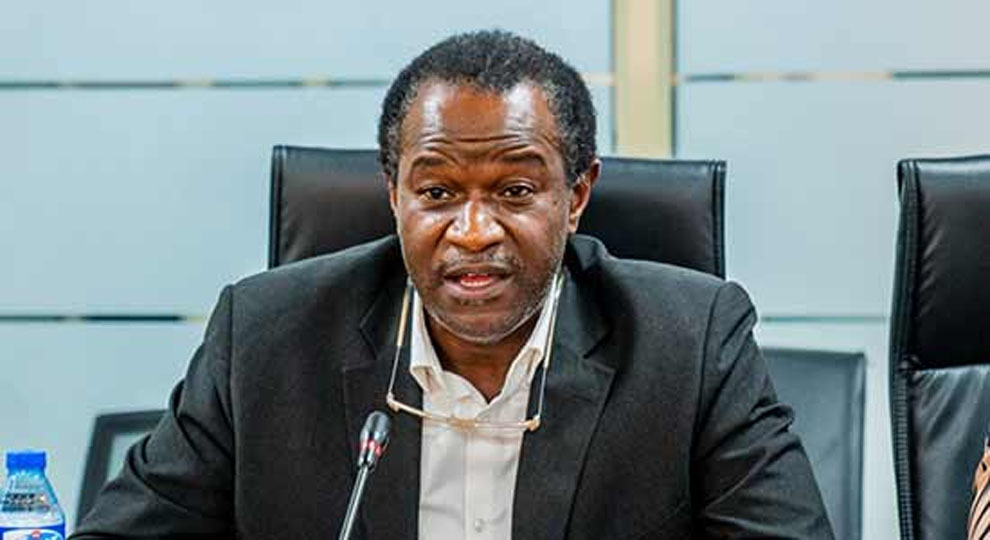“I will be firm, fair, and transparent in the discharge of my duties. UNN must not lag behind in the current technological revolution, characterised by the rivalry between OpenAI and DeepSeek,” he assured.

Ismail Adegboyega Ibraheem has become a full-fledged professor of communication and journalism studies at the University of Lagos. This follows the approval of his elevation to the enviable position by the university’s governing council.
In a terse reply to an enquiry from the NewsTrends on Friday, the brand new professor stated, “I am delighted to inform you that the University of Lagos Governing Council has ratified my appointment as a professor of Communications and Journalism Studies.”
The approval was said to have come on Thursday, March 3, 2022, from the governing council having considered him fit for the exalted position.
He was until his promotion the Acting Director International Relations, Partnerships and Prospect and an associate professor at the Department of Mass Communication at the university.
A former British Chevening Scholar, Ibraheem has more than 25 years of cumulative experience in both industry and academia.
He attended the University of Lagos between 1986 and 1992 where he obtained a first degree in mass communication and master’s degree in political science.
He is also a graduate of the revered University of Leicester, United Kingdom, where he obtained master’s and PhD qualifications in Mass Communication, specializing in media and public policy analysis between 1997 and 2004.
Ibraheem has a wealth of experience working for private, public and voluntary sector organisations in the United Kingdom and Nigeria.
His industry experience includes working with global experts to mobilise academics to develop strategies to combat global poverty and development challenges as well as working as a member of a committee of experts commissioned by the Government Office for the East Midlands (GOEM) in the United Kingdom to review proposals on new ways of community governance through the Empowerment White Paper titled: Unlocking the talent of our communities.
His academic experience also includes using evidence-based practice to develop pedagogical resources and using reflective methodology to promote interactive student-focused learning in course delivery.
He has supervised more than 100 postgraduate students and mentored over 50 students now occupying important and strategic positions in both the industry and the academia.
Ibraheem is the Chair of Cable News Foundation, Nigeria, Co-Chair West Africa for Academics Stand Against Poverty (ASAP), and Member of Board, Endow Africa.

UNN appoints Prof Olayiwola Usman as first Yoruba DVC (Academics)
The University of Nigeria, Nsukka (UNN) has appointed Professor Kamoru Olayiwola Usman, a Yoruba Muslim from Oyo State, as Deputy Vice-Chancellor (Academics), marking the first time in the institution’s history that a person of Yoruba descent has held the position.
The appointment, made by the Acting Vice-Chancellor (Ag. VC), Professor Oguejiofo T. Ujam, is part of ongoing reforms aimed at fostering inclusive governance and restoring the university’s academic excellence.
In a statement issued yesterday in Abuja, the university reaffirmed its commitment to merit-based leadership and national unity.
Professor Ujam stated: “The appointment of Professor Usman reflects our resolve to prioritise competence over sectional considerations. It is imperative that we sustain this culture of inclusivity and meritocracy to move the university forward.”
In addition to Professor Usman’s appointment, the Acting VC also named Dr Mansur Adebowale Saddiq as Acting Director of the Medical Centre, further demonstrating his commitment to promoting excellence over sectional interests.
Both appointments have been widely welcomed by scholars and students from diverse backgrounds, recognising them as steps towards strengthening national unity within the institution.
READ ALSO:
Professor Usman, who succeeds Professor Urama, holds a PhD in Mathematics Education and previously served as Provost of the Federal College of Education (Special), Oyo State, from 2015 to 2023.
A distinguished academic, he is a fellow of the Mathematical Association of Nigeria and a member of several professional bodies, including the National Institute of Policy and Strategic Studies and the Nigerian Educational Research Association. His initial tenure as DVC (Academics) will last for two years, with the possibility of renewal.
Meanwhile, the statement also highlighted that during a recent University Senate meeting, Professor Ujam emphasised the collective responsibility of repositioning UNN as a centre for ethical and innovative learning.
“A collective effort is required to place the institution on a steady path towards ethical and innovative learning. UNN must regain its pride of place as Nigeria’s premier university. We must rid the system of narrow-minded sectionalism and divisive tendencies that have eroded the enabling environment for research, comparative studies, and the adaptive application of new knowledge,” the statement read.

FG to pay corps members backlog of delayed N77,000 allowance
The Federal Government has promised to pay the backlog of the new ₦77,000 monthly allowance to members of the National Youth Service Corps (NYSC).
The corps members’ allowance was increased from ₦33,000 to ₦77, 000 in September 2024.
However, the new rate has yet to be implemented.
Minister of Youth Development, Ayodele Olawande, on Monday said serving corps members and those in the scheme when the increment was announced in September 2024 would receive a backdated payment.
He gave the assurance when he was featured on Channels Television’s Politics Today.
He said, “You saw the new DG saying that you will get it, and they’re asking him a question ‘What about those that are going out now, are they going to receive it [backlog]?’ He said ‘We have your details’,” the minister said.
“The backlog, we will work on it and make sure it is paid. It may not be immediate but it will happen.”

Why postgraduate students are ineligible for FG loan – NELFUND
The Nigerian Education Loan Fund (NELFUND) has clarified the eligibility criteria for the scheme, explaining why students pursuing post-graduate programmes are not qualified to apply for the facility.
Managing Director of the Fund, Akintunde Sawyerr, gave the revelation while speaking on TVC’s Breakfast Saturday.
Sawyerr also addressed concerns regarding postgraduate students’ eligibility for the loan, explaining that the facility is currently only available to students pursuing their first degree.
“The way the President has set this up and the way he has insisted that this must work is that you don’t need to know anybody to access this loan. And that’s what we are doing. No connections, no long leg, no man-know-man. We are not going to allow it to happen. The President wants us to completely democratize education.”
Although repayments have not yet been received, the Managing Director assured that the Fund is developing a robust repayment structure to facilitate timely and effective loan repayments.
He said currently, postgraduate students are not eligible to apply for the loan, as the primary focus is on supporting students pursuing their first degree.
Sawyerr, however, offered a glimmer of hope for postgraduate students, indicating that they may be eligible for the loan facility in the future.
“Post-graduate students can’t apply for this loan. We have a lot of people in this country who are just trying to get on the first rung of the ladder as far as tertiary education is concerned. The funds we have are focused on those people who are looking for their first opportunity.
READ ALSO:
“I congratulate those who have graduated who are doing their Master’s or PhDs, it’s fantastic. At some point in the future, we will be able to fund them. Today, we are looking for those who need us most. They are the people we want to support.”
He emphasized that while plans exist to extend financial support to postgraduate students, the immediate priority remains assisting undergraduates who face financial difficulties.
The Fund is committed to ensuring that students do not drop out of tertiary institutions due to lack of funds, and future adjustments to the loan scheme will be considered based on available resources and policy direction.
According to the Managing Director, revealed that more than 271,000 Nigerian students pursuing tertiary education have received a financial lifeline through the Federal Government’s Student Loan program since its launch in May 2024.
“Nigerian students are reacting extremely positively to the initiative. And as more disbursements happen, they are becoming more trusting. One of the interesting things going on at the moment is that President Bola Tinubu is restoring trust in the government. The students are receiving it well. We are transparent about what we are doing.
“In total, to date, we have about 271,000 Nigerian students who have either had their fees paid or their fees plus upkeep,” he noted.
As of Saturday, March 22, out of 521,000 students who have registered for the loan facility, approximately 438,000 have submitted their applications.


Attack on Mufty of Ilorin: Onikijipa Family Charges Stakeholders to Call Sheikh Habibullahi Al-Ilory to Order


Nigerian doctor pioneers W’Africa first robotic prostate cancer surgery


Rivers administrator Ibas fires Fubara’s political appointees


Fubara: Supreme Court reacts to photo of Justice Agim with Wike


UNIOSUN mourns as 5 students die in auto crash


JUST-IN: Ex-Oyo gov Ajimobi’s first child Bisola dies At 42


Canada removes bonus ranking points for job offers in Express Entry system


How ritualists, native doctor drugged, murdered underage sisters in PH – Police